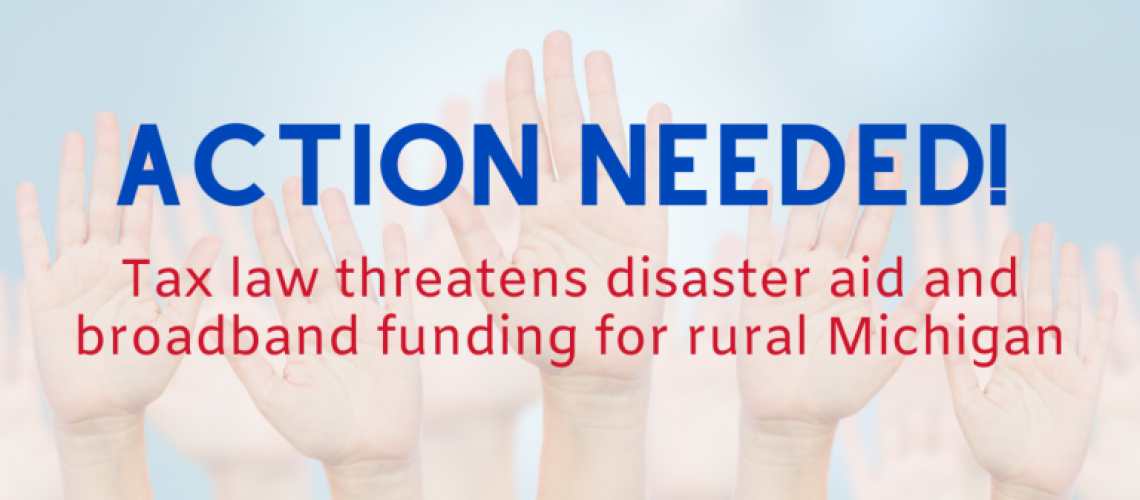 By Bill Scott
By Bill Scott
We Michiganders are a hardy lot and we are no strangers to inclement weather. When the blizzards come, when the ice pelts, when a summer storm rolls in over the Great Lakes, we steady ourselves and then set to work cleaning up the damage left in the wake of mother nature’s fits of fury.
When the Labor Day storm struck western Michigan in 2018 without warning, Great Lakes Energy employees rolled up their sleeves and set to work. Through howling winds, pelting rain, and tireless nights they were committed to ensuring that you, our members, had the lights back on as quickly and safely as possible.
This steely spirit is what drives not just our electrical cooperative, but all electrical cooperatives throughout the country. Storm cleanup usually has a high price tag, and instead of forcing the members to bear the entirety of the clean-up bill, cooperatives rely on federal and state grants to assist with storm recovery.
But due to an unintended consequence of federal tax law changes in 2017, electric co-ops may be penalized for accepting that aid.
Electric co-ops are private, not-for-profit companies created to supply electricity to their member-consumers. They belong to the communities they serve and operate at cost. Most of the more than 900 electric co-ops nationwide are recognized as tax-exempt organizations by the IRS as long as they receive no more than 15 percent of their income from non-members.
Here’s the situation:
- Tax law changes classify federal, state or local government grants as non-member revenue. If your co-op receives FEMA disaster relief aid, energy efficiency grants, economic development support, or rural broadband grants, these grants will be considered non-member revenue and your co-op’s tax-exempt status could be at risk. Great Lakes Energy qualified for and received one of these federal grants to help us build our fiber network to sparsely populated rural areas.
- The RURAL Act, a bipartisan bill introduced in the House and Senate, would fix the problem. It already has strong and growing bipartisan support among nearly 290 House members and 45 senators.
- The bills will restore certainty and common sense by ensuring that co-ops won’t have to spend more of their members’ money paying taxes when they restore power after a storm or invest in broadband internet to close the digital divide.
It defies logic for one government agency to distribute assistance funds with the right hand only to have the IRS take back those funds with the left. Even those rural areas and co-ops not affected by natural disasters are vulnerable under the new tax law, because any kind of federal, state or local grant (broadband, economic development, etc.) has the potential to push co-ops over the 15-percent threshold.
Thankfully, there is a common-sense remedy on the table. The bipartisan RURAL Act (H.R. 2147 and S. 1032), introduced by Reps. Sewell (D-Ala.) and Smith (R-Neb.) and Sens. Portman (R-Ohio) and Smith (D-Minn.), will restore certainty and common sense. The bill ensures that co-ops do not jeopardize their tax-exempt status when they accept government grants.
I am asking that you take one simple step to support this effort.
Simply go to action.coop and use the email template to ask your senators and member of Congress to urge leadership of both parties to bring the RURAL ACT up for a vote. This website also has more information on the legislation under the “Learn More” tab.
If we all join in this effort, it will be a very powerful message to Congress to fix this unintended tax loophole.
Time is running out and lawmakers must pass legislation this year. While many of Michigan’s congressional delegation in both the House and Senate have co-sponsored the bill, we need them to take the vital next step and push the bill to a vote. Passage of the RURAL Act in 2019 is essential for America’s rural communities.
Bill Scott is the president/CEO of Great Lakes Energy Electric Cooperative, the largest Michigan not-for profit electric cooperative serving 125,000 members in western, lower Michigan.


